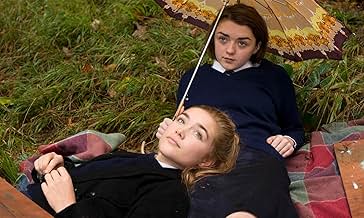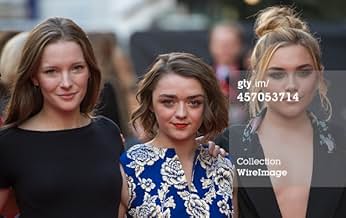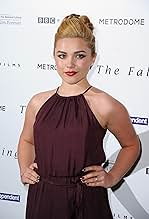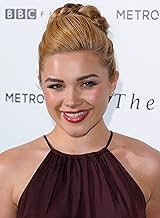It's 1969 at a strict English girls' school where charismatic Abbie and intense and troubled Lydia are best friends. After a tragedy occurs at the school, a mysterious fainting epidemic brea... Read allIt's 1969 at a strict English girls' school where charismatic Abbie and intense and troubled Lydia are best friends. After a tragedy occurs at the school, a mysterious fainting epidemic breaks out threatening the stability of all involved.It's 1969 at a strict English girls' school where charismatic Abbie and intense and troubled Lydia are best friends. After a tragedy occurs at the school, a mysterious fainting epidemic breaks out threatening the stability of all involved.
- Awards
- 3 wins & 5 nominations total
- Titch
- (as Rose Caton)
- Director
- Writer
- All cast & crew
- Production, box office & more at IMDbPro
Featured reviews
Then tragedy happens and Masie starts to have fainting fits – very soon the phenomenon spreads and she seems to be at the centre of it. Throw in a mum with issues (Maxine Peake) and a bit of the Occult, forbidden sex and deep rooted paranoia and you have the makings of a rather good story.
Maxine Peake is billed starring here, but she is not really on screen for a great period of time; Greta Scacchi as the dowdy Miss Mantel is though pure excellence in a performance dripping with understatement. I have seen comparisons to 'Picnic at Hanging Rock' and even the events around Salem and the subsequent Witch trials. However, I think such comparisons may lead to expectations that may not be met. It is though a film that had a great idea and I think it could have been taken much further as it sort of peters out; despite that it is still on I can recommend.
A psychological contagion enabling the exploration of sexuality, moulded by misty melodrama against an autumnal period backdrop. Disturbingly beguiling in nature, through metaphorical body possessions that highlight supernatural elements within the obtrusive sexual motives. Morley, for the most part, captivates when allowing her acting talent to shine through. An innocently naive Williams bravely controlling every scene in her leading role as a psychologically deterred student whom seemingly is a catalyst for the hysteria breakouts. Hospitalised, psychoanalysed and actively withdrawn from therapy, the spells of hysteria are never elaborated. An unexplainable mass psychogenic illness. Morley's intent in ambiguity enables her ostentatious narrative to visualise sexualisation. Hormonal chemicals invading the bloodstream and controlling the mind. A possession, if you will.
Conversely, her screenplay resorts to ethereal poetry and psychedelic narration, emphasising the connectivity between these girls. Unfortunately, several conversational scenes spoon-feed proposed metaphors for the assurance of acknowledgement, most notably the one-sided therapy session that Lydia and her friends endure. Diminishing the bold interpretations that preceded the conclusive act almost indefinitely.
Then the final ten minutes commence and Morley outwardly encounters her own spell of hysteria. The tone alters. The mood unequivocally changes. The pace quickens. She dabbles into darker subjects, a territory that heavily contrasts with the predominantly mystifying narrative. The virginal Lydia interrogating her neglectful agoraphobic mother regarding her father, whilst developing an incestuous relationship with her brother. Discovering her true roots, subsequently offering a hereditary reasoning for her mental instability. It's at this point where Morley loses that tight narrative control. Explicitly presenting a shallow explanation that manages to resolve familial turmoil in a matter of minutes, allowing the supernatural aura to dissipate. Not to mention how under-utilised and misdirected Peake was. Fortunately Pugh's illuminatingly perfect performance makes up for lost talent. The editing imaginatively strings various images together during rapid flashback scenes, which proved effective for the most part. Thorn's soundtrack however was too audacious and overpowering, likening The Falling to a casual summer school trip rather than an existential piece of art.
Morley is a credible director, and The Falling is one feature that uniquely tackles a variety of subjects in a mesmerisingly imaginative manner. Its fundamental issues however are situated in its inappropriate climax and misplaced technicalities that allow the narrative to repetitively faint far too often.
That being said, there is an actually problem and it's not with the film itself but rather with those that have watched it and how clueless the conclusions seem to be.
1. The reason Lydia is acting the way she is is obvious. Because her semi lesbian relationship was in the process of disintegration when the other girl died after cheating on her. She doesn't know how to deal with it so she begins acting out. She is, after all, only a child.
2. The fainting spells are also rather obvious. They are real for some of the girls and not for others. They have been picking at the wall in one of the rooms. Obviously there must be mold or something in the crack. It could also be lead poisoning given the time period. And then they are sticking their fingers into each others mouths or their own. It's quite obvious that some of them have ingested something that will harm them.
3. Not all of them die, so there is another issue. Abigail was pregnant. There is a blood toxicity that can happen while pregnant. When I was little my best friends mum was confined to bed for months while she was pregnant because this almost killed her. She ended up in the hospital for almost a month. This, combined with what might be in that wall, is likely the cause of Abigails death. Given that technology wasn't nearly as sophisticated at the time this movie takes place, they may not have known what caused it.
The movie may be boring but thinking through the answers shouldn't be so difficult.
Alas this film, which I thought would match this from the reviews I read, did not come anywhere near it. Whereas this was certainly a personal project to writer / director, to everyone else it really is a non-sensical load of tosh. Neither eerie, classy, engaging or atmospheric.
The school group was similar to "Picnic" i.e. pretty centre of attention girl, mixed up clever girl down to fat eat a lot girl...pretty stereotypical characters.
When the fainting/shaking actually occurs, especially in the school assembly scene I'm afraid it became comical. They were obviously well drilled on how to faint.
The Director did try to convey a sense of nature at work here. For example, intimating that Abbie's spirit lingered among the old oak tree, straight through to hearing fox cries, owls hooting, even in the scenes shot in Lydia's house! Needless to say the (step)brother and (step)sister "getting it on" scenes were pretty uncomfortable. On that point was not convinced on the Mother character, especially the acting.
Major plus however, Florence Pugh, she is going to go far. A great looking girl with a distinctive voice and she can sing play guitar.
Did you know
- TriviaAccording to Maisie Williams, director Carol Morley instructed Maxine Peake (Eileen Lamont) to not communicate with Williams (Lydia Lamont) and to keep her distance from her, in order to replicate the lack of relationship between their characters. Morley did not tell Williams about this, which left Williams feeling disliked and upset throughout the shoot due to the way Peake was ignoring her. Williams eventually found out about it during the wrap party after shooting had ended, when Peake told her about Morley's instructions and apologized for any upset caused.
- Goofs(at around 21 mins) Abbie is stirring her pudding with her left hand. When the camera angle changes, the spoon is in her right hand and her left hand is up under her chin.
- Quotes
Lydia Lamont: I resent this idea that we're just emotional. This is real.
Psychiatrist: It's real, it has consequences, yes. What's important here is that it's real to you.
Lydia Lamont: Real to me, what does that mean? It's real to all of us. Something's seriously wrong. Why is everyone ignoring us?
- Crazy creditsDisclaimer near the end of the credits: "Although this film was inspired by a variety of real episodes of mass psychogenic illnesses, the narrative is entirely fictional."
- ConnectionsFeatured in Film '72: Episode #44.3 (2015)
- How long is The Falling?Powered by Alexa
Details
Box office
- Budget
- £750,000 (estimated)
- Gross worldwide
- $569,498
- Runtime
- 1h 42m(102 min)
- Color
- Aspect ratio
- 1.85 : 1

































